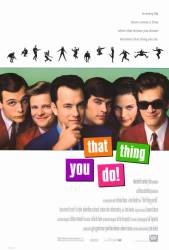Corrected entry: In the scene where Guy's family is watching the Wonders on TV, they are using a wireless remote control to adjust the TV. The film is supposed to take place in 1964, but wireless remote controls for televisions were not available until the 1970s.
Corrected entry: The bass player and Faye are each listening to a "Walkman" to hear the song on the radio. The movie was set in 1964 and the "Walkman" was invented in the late 1970s.
Correction: Actually, those are transistor radios, which had earpieces to listen privately and not disturb others around you.
Corrected entry: After the band first plays at Villapiano's, the bartender lines up a row of bills in front of Steve Zahn. He then turns one $5 bill sideways, saying it's the band's bonus. When the scene cuts back and forth from the bartender's view to Steve Zahn's - the $5 bill appears and disappears a couple times as the point of view changes.
Correction: In watching this scene, after the bartender turns the $5 sideways, the camera never even shows the bills on the counter again until near the end of the scene, where the $5 bill is shown in the same spot as where the bartender first placed it. (Viewed in the longer Director's Cut of this movie.)
Corrected entry: When the band wins the talent contest at the beginning, there is a shot where the owner of Villipiano's is asking if the guys would play at his place. One shot shows the bass player all smiley and then it immediately changes shots with him the background dead serious.
Correction: During the entire scene of the owner of Villipiano's asking them to play, there is not a single shot of the bass player.
Corrected entry: The scene on the Matterhorn at Disneyland shows that the car is two connected. In the early 60's it was a SINGLE car ride.
Correction: Actually those cars are original, the Disney company recommissioned a retired old-style ride car for the movie so it would be historically correct for the time period.
Corrected entry: The father looks at an ad for a competing store which indicates the store is open on Sundays. If this is the mid 60's, Sunday sales were prohibited by law (the infamous blue laws). I don't believe the blue laws were abolished until after the date of this movie.
Correction: Actually, blue laws, although common, were not mandated on either state or federal level. Each city determined its own "blue laws," and what may have been illegal in one town was not illegal in another.
Corrected entry: In the hotel gift shop Faye says hello to Lamarr, calling him by his name before he introduces himself to her. And she acts like she has never heard his name before.
Correction: It's not Faye that says hello to Lamarr, it's the store clerk. Then, he introduces himself to Faye.
Corrected entry: Several times during the film, set in the early 60's, Lenny the guitar player refers to Erie, Pennsylvania as Erie, PA. Guy Patterson, the drummer, refers to it as Erie, Penn. I believe Erie, Penn. would be more accurate. The two letter state abbreviations came much later than the early 60's.
Correction: Use of the abbreviation "Pa." goes back as far as 1831. In 1963 when the USPS created ZIP codes, they also created state abbreviations to make room when addressing letters/packages. (Prior to this the USPS preferred the complete state name to be written in full).
Corrected entry: When the band is at the hotel in Hollywood, a reporter asks them "Why don't you have long hair like The Beatles?" The movie is supposed to have taken place in 1964, The Beatles didn't have long hair at that time, it wasn't until a few years later.
Correction: The mop-style haircuts that the Beatles had when they first became popular were considered long at the time. This was a time when the norm was buzz cuts and military style cuts were the big style on men. Their "long" hair is one of the things that made parents at the time dislike them, thinking that it was a bad influence on their kids.
Corrected entry: In the scene where the guys are performing in Illinois the camera moves to an overhead shot and we can see the guys performing on a huge Playtone record. If you read carefully the Playtone record says that the song was written by James Mattingly III however, when the guys meet Saul Siler Jimmy introduces himself as James Mattingly the second.
Correction: Actually, the label on the huge record does say James Mattingly II. If you don't look carefully, the parentheses at the end makes it look like III.






Correction: Actually, wireless remotes were introduced in 1956. http://www.ideafinder.com/history/inventions/remotectl.htm.
Rlvlk